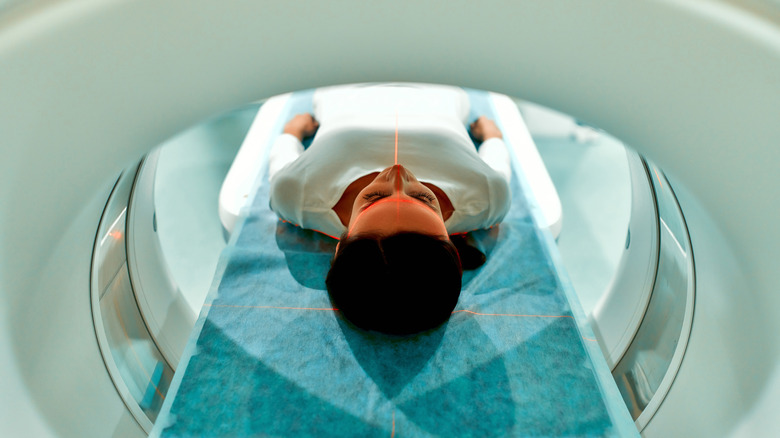Can Brain Scans Really Help Determine When Mental Health Will Worsen?
Up until now, mental illnesses like depression and psychosis have only been diagnosed and treated based on a patient's symptoms, medical history, and clinical observations (per Neuroscience News). But new research published in the journal Biological Psychiatry has found that brain scans can actually be useful in predicting mental health outcomes.
The study focused on the volumes of gray matter in the brain. According to Simply Psychology, gray matter is present on the outermost layer of the brain and is found in the cerebrum, cerebellum, brain stem, and the spinal cord. It's what allows us to control movements, retain memories, regulate our emotions, and more. It begins developing in utero and continues until we're about 8 years old. At that point, the amount of gray matter throughout the brain decreases, although its density increases. This higher density is what helps us with higher processing and mental development. So, how can this information be useful in predicting mental illnesses?
How MRIs are paving the way for more precise diagnostics
The study published in Biological Psychiatry looked at MRI brain scans of 577 patients who were recently diagnosed with depression or psychosis. Participants were divided into two groups based on the volume of gray matter present in their brains. Researchers were able to predict that those with lower volumes of gray matter would go on to have poorer mental health outcomes and were also more at risk for high levels of inflammation, poor concentration, and other cognitive impairments (per Neuroscience News). Conversely, participants with higher volumes of gray matter were more likely to recover well. An algorithm was created to predict the participants' conditions nine months later, which was found to be more accurate than traditional systems of diagnosis.
The longer a participant had suffered from their condition, the more likely they were to have lower gray matter volume, according to the study's lead author Paris Alexandros Lalousis (via Neuroscience News). This study is important because it gives scientists insight into the biology of mental illness, which can help them understand their development and the best treatment options. While the research is promising, larger-scale trials are still needed.


